Interested in writing for our blog? Send your pitches to editor@miff.com.au.
No Time for Quiet – Q&A with directors Hylton Shaw & Samantha Dinning
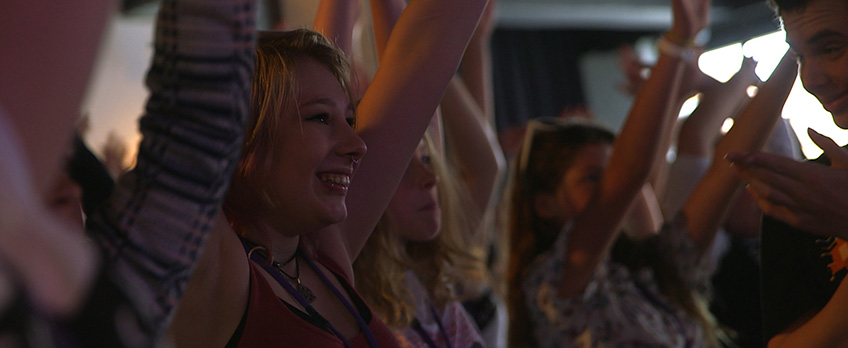
Featuring appearances from rock sensation Courtney Barnett, local punk trio Cable Ties and Sikh-Australian slam poet Sukhjit Khalsa, No Time for Quiet joins a group of girls and gender-fluid youths as they discover the empowering strength of music through a GIRLS ROCK! camp in Melbourne. Here, directors Hylton Shaw & Samantha Dinning discuss making the film with an all-female cast and crew, the benefits of music for people living with mental illness and the importance of representation.
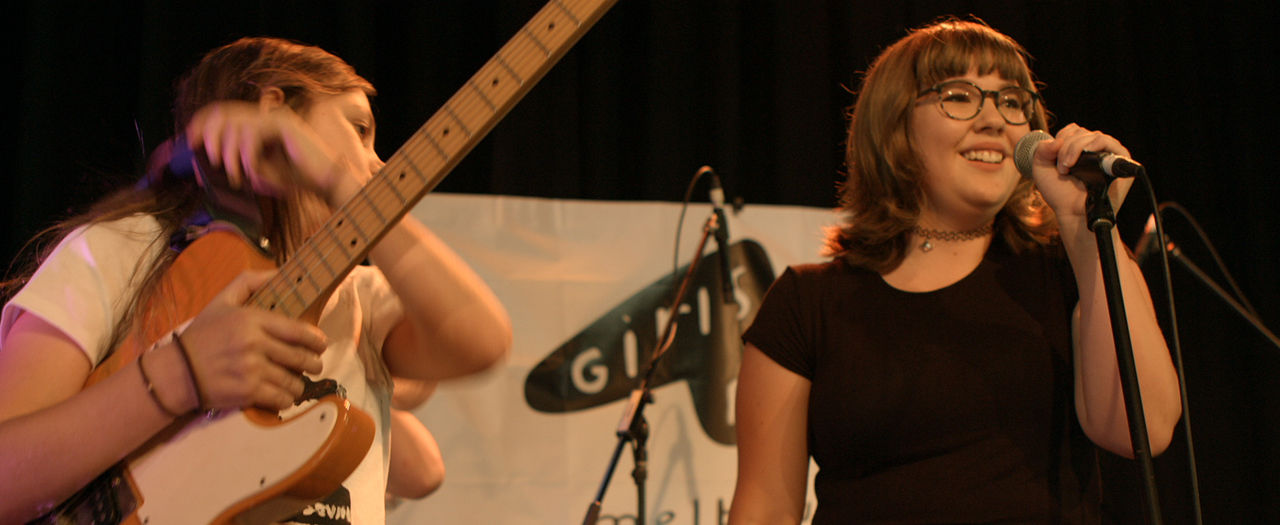
A scene from No Time for Quiet
No Time for Quiet is set in Melbourne’s unique music scene – particularly around the live music venues of the northern suburbs – at its first Girls Rock! camp. Can you tell us a bit about Girls Rock!, here and around the world?
The first Girls Rock! camp was in Portland, Oregon, which – much like Melbourne – has a thriving music scene that forms part of the fabric of the city. Girls Rock! now operates in more than 80 cities worldwide including Tokyo, Buenos Aires, Glasgow and Reykjavík. Every city has its own unique community and music scene, but Melbourne’s scene is close knit and welcoming and, from what we could see whilst making the film, tries to challenge the national status quo by promoting inclusive and representative musicians who aren’t cis white males. Furthermore, there are particular Melbourne venues, labels, organisations and musicians that continue to push for a more diverse scene where the voices of women, trans and gender diverse people are promoted.
Girls Rock! Melbourne is attended by many volunteers, all of who identify as female, trans or gender diverse. They organise everything from logistics, venues, band coaching, instrument instruction and screen printing. The supportive and safe community that Girls Rock! Melbourne has created is a reflection of what is trying to be achieved at large in the city – it aims to address the inequality that still exists within the industry by creating a nurturing and inspirational environment for all those who attend. This DIY sense of community is rare and extraordinary and one that we hope continues to grow nationwide.
Your film features some raw and confronting moments of young people dealing with mental illness. While directing this film, what did you discover about the relationship between making music and its effect on mental health?
What we observed throughout the two years that we worked on this film is that there making music offers a multitude of benefits for people who are struggling with mental health issues. Music is therapeutic and transformative and, whether you are an experienced musician or not, is a way to channel and process your thoughts and feelings in a constructive manner. From bashing the drums and creating fills to standing as the lead singer and belting out a lyric you wrote yourself, the young people we met had a platform to release their feelings without judgement or exclusion. It increased their self-esteem, they felt supported and validated and not a burden to those around them.
For many, forming a band and performing has given them not only purpose and hope but provided them with a sense of safety and comfort. Songwriting, especially, can be extremely validating for someone who feels they don’t have a platform to tell their story. Our film demonstrates that these processes can really aid in building self-worth and validation, and more importantly instill a huge sense of pride as the young people listen to and sing about their story with their own words, on their terms, in a safe environment.
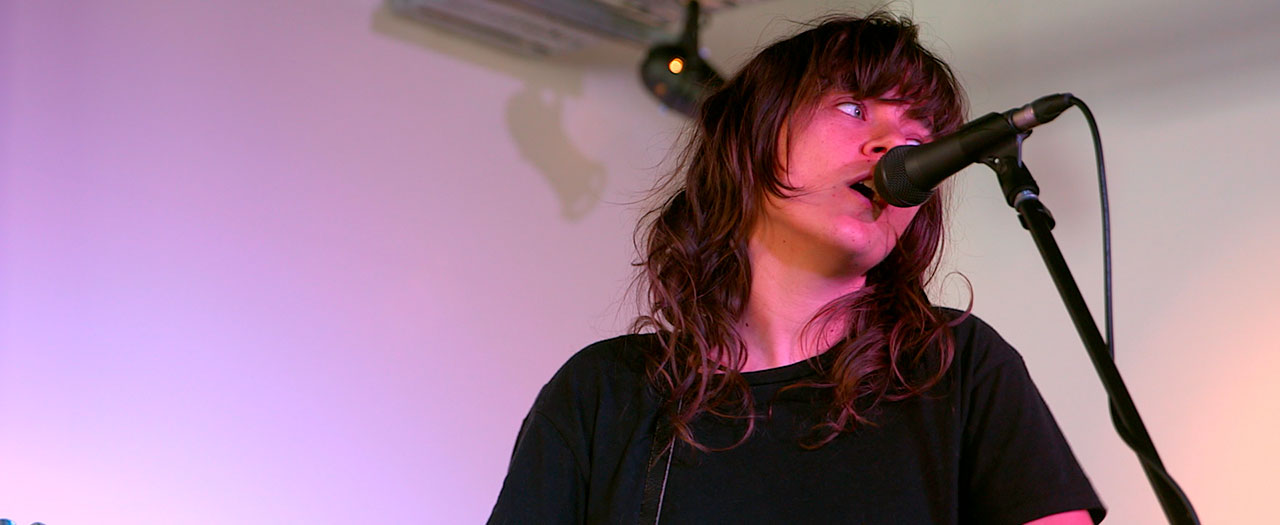
Courtney Barnett in a scene from No Time for Quiet
Courtney Barnett and Cable Ties are just some of the artists involved as mentors for Girls Rock! – what did you observe about their relationship to the girls and their influential roles as mentors?
We were very fortunate that the camp we documented was attended by some really influential musicians and artists such as Courtney Barnett and Cable Ties. These musicians are massive supporters of Girls Rock! and all wish they had participated in something similar when they were growing up. Volunteering their time to such a grass roots and community-led program enables something much bigger to occur within the camp: it allows the young people to see what they could potentially be; it gives them access to musicians who have gone down various roads in making music and forming bands; and shows the young people the different paths you can take to pursue music, and that it doesn’t have to be conventional.
The mentorship that these musicians provide is invaluable and inspires and encourages the young people to be their authentic selves. We saw a noticeable positive shift in a lot of the campers after a performance or a Q&A with some of the mentors, and we honestly believe that is because of the age-old clichéd saying ‘you can’t be it if you can’t see it’. Not so much of a cliché when it comes to girls, trans and gender diverse people in rock n roll.
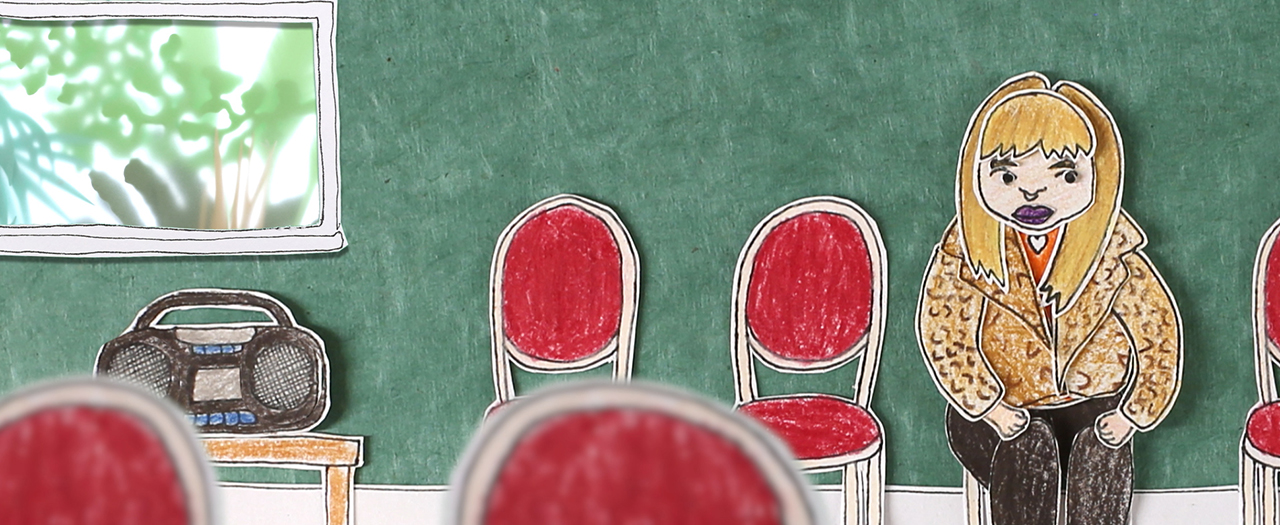
A scene from No Time for Quiet
One striking part of the film is the animations that accompany some of the participants’ reflections. Could you talk more about how these animated sequences came together for the film?
We worked very closely with award-winning animator Isobel Knowles (who co-directed Passenger in this year’s VR program) to create an environment where we could most accurately portray the inner-most worlds of our subjects. Keen for each of the young people to tell their own stories, Isobel asked each them to come and work with her in her studio to create the worlds that we were trying to portray, based on their personal experiences. Often these discussions were very candid and raw, but together they drew on feelings and images and forged a plan for each person’s individual animation.
What resulted was a beautiful series of personalised stories that feature the actual work of each young person, masterfully animated by Isobel to portray those introspective reflections. The process for both Isobel and the young people was one that was truly fulfilling.
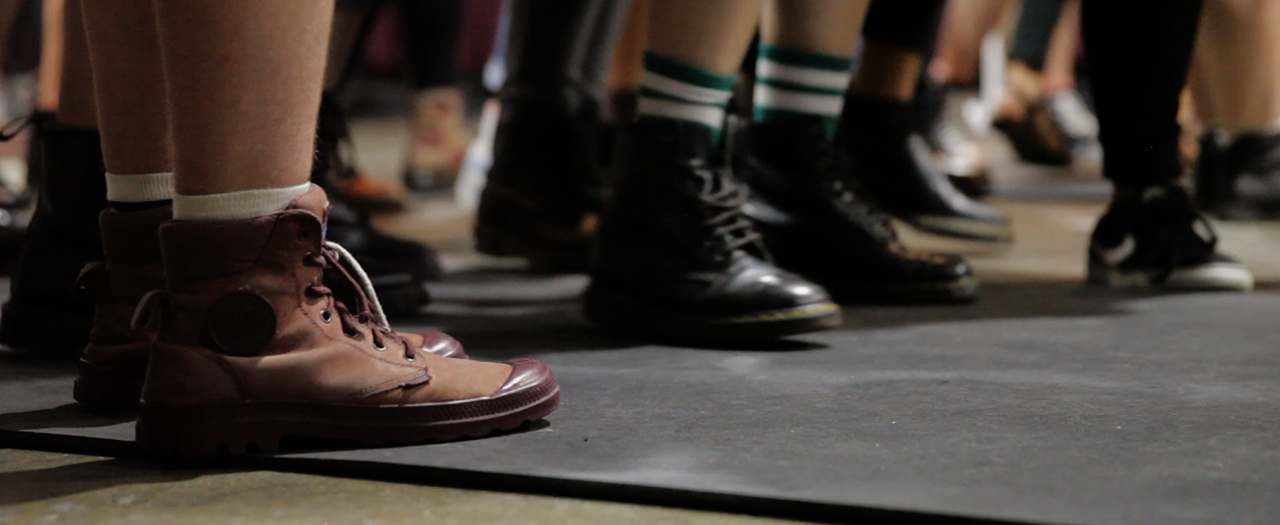
A scene from No Time for Quiet
For this project, you worked with an all-female crew. What have you learned about building safe and inclusive spaces for women within both the music and film industries following the making of this film?
Embarking on this project, we wanted to work with the best people to tell the story. For us, this meant primarily women in the industry who we have both worked with before and whom we wanted to work with again, owing to their prior experience and understanding of music and the Melbourne community. We found this experience to be really unifying, highly satisfying and fairly seamless. We were extremely fortunate to work with an array of talented practioners – without their expertise and talent, this film wouldn’t have been possible.
Throughout the process of making the film, we saw an increase in the amount of media coverage detailing the lack of safe spaces for women, trans and gender fluid people, particularly in live music venues and festivals throughout Melbourne and Australia. This is an issue that is far from fixed, however there are people within these communities that are doing important work and making progress to carve out spaces where people feel safe. This includes running workshops, educating venues and curating inclusive and accessible events. We have learnt that this work is not only crucial in progressing our current scene but is essential in allowing the next generation of musicians, punters, artists and bands to feel empowered to speak-up, call-out and raise issues.
Over the same time period, we witnessed a rise in discussion and activity designed to redress the woeful underrepresentation of women in the Australian screen industry. Within the film and television industries, there are certainly production companies and broadcasters that are actively trying to eliminate sexual harassment and create safer spaces, however it’s still quite a dark and hidden underbelly driven by power and gender. The key to creating these safe spaces is not just discussing it and having a facilitator run a session – it’s creating relationships between the crew and the producers and the production company that allows issues to be raised in a trusting and supported environment with complete transparency and respect.
The safe and inclusive environment of Girls Rock! epitomises what both the film and music industries are still lacking – an environment where you can go about your day, work, home life without fear of judgement, exclusion or harassment. Girls Rock! does this through building self-esteem and self-confidence, and by providing positive, female/trans/gender diverse-led environments that cultivate a supportive community of people who together can solve issues in a meaningful and constructive way.
It is our hope that the audience can recognise that this type of space is fundamental in achieving greater gender equality for our future rock n rollers!